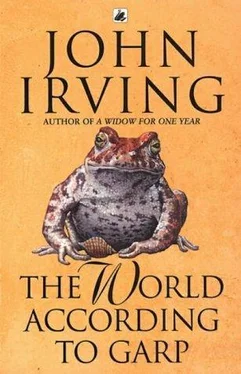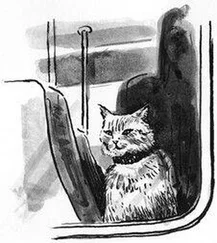“Your taillight's broken,” I pointed out to the plumber. “You shouldn't be driving around that way.”
“I'm going to call the cops on you , you crazy bastard!” said O. Fecteau.
“This is a citizen arrest,” I said. “You broke the speed limit, you're endangering the lives of my children. We'll go see the cops together.” And I poked the long pipe under the truck's rear license plate and folded the plate like a letter.
“You touch my truck again,” the plumber said, “and you're in trouble.” But the pipe felt as light in my hands as a badminton rocket; I swung it easily and shattered the other taillight.
“You're already in trouble,” I pointed out to O. Fecteau. “You ever drive in this neighborhood again, you better stay in first gear and use your flasher.” First, I knew (swinging the pipe), he would need to repair his flasher.
There was an elderly woman, just then, who came out of her house to observe the commotion. She recognized me immediately. I catch up to a lot of people at her corner. “Oh, good for you!” she called. I smiled to her and she tattered toward me, stopping and peering into her well-groomed lawn where the toy dump truck arrested her attention. She seized it, with obvious distaste, and carried it over to me. I put the toy and the pieces of broken glass and plastic from the taillights and the flasher into the back of the pickup. It is a clean neighborhood; I despise litter. On the open road, in training, I see nothing but litter. I put the other pipes in back, too, and with the long pipe I still held (like a warrior's javelin) I nudged the screwdriver and the spools of wire that had fallen by the curb. O. Fecteau gathered them up and returned them to the metal drawer. He is probably a better plumber than a driver, I thought; the Stillson wrench looked very comfortable in his hand.
“You should be ashamed of yourself,” the old woman told O. Fecteau. The plumber glared at her.
“He's one of the worst ones,” I told her.
“Imagine that,” the old lady said. “And you're a big boy,” she told the plumber. “You should know better.”
O. Fecteau edged back to the cab, looking as if he would hurl his wrench at me, then leap into his truck and back over the old biddy.
“Drive carefully,” I told him. When he was safely in the cab, I slid the long pipe into the pickup. Then I took the old woman's arm and helped her along the sidewalk.
When the truck tore away from the curb, with that stink of scorched rubber and a noise as raw as bones leaving their sockets, I felt the old lady tremble through the frail point of her elbow; something of her fear passed into me, and I realized how risky it was to make anyone as angry as I had made O. Fecteau. I could hear him, maybe five blocks away, driving furiously fast, and I prayed for all the dogs and cats and children who might be near the street. Surely, I thought, modern life is about five times as difficult as life used to be.
I should stop this crusade against speeders, I thought. I go too far with them, but they make me so angry—with their carelessness, their dangerous, sloppy way of life, which I view as so directly threatening to my own life and the lives of my children. I have always hated cars, and hated people who drove them stupidly. I feel such anger toward people who take such risks with other people's lives. Let them race their cars—but in the desert! We would not allow an outdoor rifle range in the suburbs! Let them jump out of airplanes, if they want—but over the ocean! Not where my children live.
“What would this neighborhood be like without you?” the old woman wondered aloud. I can never remember her name. Without me, I thought, this neighborhood would probably be peaceful. Perhaps deadlier, but peaceful . “They all drive so fast,” the old lady said. “If it weren't for you, I sometimes think they'd be having their smashups right in my living room.” But I felt embarrassed that I shared such anxiety with eighty-year-olds—that my fears are more like their nervous, senile worries than they are the normal anxieties of people my own young middle age.
What an incredibly dull life I have! I thought, aiming the old woman toward her front door, steering her over the cracks in the sidewalk.
Then the plumber came back. I thought the old woman was going to die in my arms.
The plumber drove over the curb and hurtled past us, over the old woman's lawn, flattening a whiplike young tree and nearly rolling over when he wheeled the truck into a U-turn that uprooted a sizable hedge and tore divots from the ground the size of fivepound steaks. Then down to the sidewalk the truck fled—an explosion of tools flying free of the pickup as the rear wheels jounced over the curb. O. Fecteau was off up the street, once more terrorizing my neighborhood; I saw the violent plumber jump the curb again at the corner of Dodge and Furlong—where he grazed the back of a parked car, springing open the car's trunk on impact and leaving it flapping.
Helping the shaken old lady inside, I called the police—and my wife, to tell her to keep the children indoors. The plumber was berserk. This is how I help the neighborhood, I thought: I drive mad men madder.
The old woman sat in a paisley chair in her cluttered living room, as carefully as a plant. When O. Fecteau returned—this time driving within inches of the living room bay window, and through the gravel beds for the baby trees, his horn blaring—the old woman never moved. I stood at the door, awaiting the ultimate assault, but I thought it wiser not to show myself. I knew that if O. Fecteau saw me, he would attempt to drive in the house.
By the time the police arrived, the plumber had rolled his truck in an attempt to avoid a station wagon at the intersection of Cold Hill and North Lane. He had broken his collarbone and was sitting upright in the cab, though the truck lay on its side; he wasn't able to climb out the door above his head, or he hadn't tried. O. Fecteau appeared calm; he was listening to his radio.
Since that time, I have tried to provoke the offending drivers less; if I sense them taking offense at my stopping them and presuming to criticize their vile habits, I simply tell them I am informing the police and quickly leave.
That O. Fecteau turned out to have a long history of violent over-reactions to social situations did not allow me to forgive myself. “Look, it's all the better you got that plumber off the road,” my wife told me—and she usually criticizes my meddlesomeness in the behavior of others. But I could only think that I had driven a workingman off his rocker, and that during his outburst, if O. Fecteau had killed a child, whose fault would it have been? Partly mine, I think.
In modern times, in my opinion, either everything is a moral question or there are no more moral questions. Nowadays, there are no compromises or there are only compromises. Never influenced, I keep my vigil. There is no letting up.
Don't say anything , Helen told herself. Go kiss him and rub against him; get him upstairs as fast as you can, and talk about the damn story later. Much later, she warned herself. But she knew he wouldn't let her.
The dishes were done and he sat across the table from her.
She tried her nicest smile and told him, “I want to go to bed with you.”
“You don't like it?” he asked.
“Let's talk in bed,” she said.
“Goddamn it, Helen,” he said. “It's the first thing I've finished in a long time. I want to know what you think of it.”
She bit her lip and took her glasses off; she had not made a single mark with her red pencil. “I love you,” she said.
“Yes, yes,” he said, impatiently. “I love you, too, but we can fuck anytime. What about the story ?” And she finally relaxed; she felt he had released her, somehow. I tried , she thought; she felt hugely relieved.
Читать дальше












